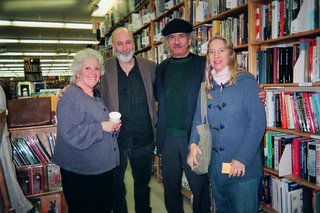 Irene Koronas: An inventive writer and experimental poet
Irene Koronas: An inventive writer and experimental poetIrene Koronas (left): With Bagel Bards: Doug Holder, Harris Gardner, and Linda Haviland Conte.
Irene Koronas, like many poets in the area, is a denizen of coffee shops. Some years ago we met at Breuger Bagels in Porter Square, Cambridge, Mass. the birthplace of the Ibbetson Street Press. Later Irene became the scribe for the weekly “Bagel Bards” meeting now held at the Au Bon Pain in Davis Square, Somerville, Mass. Irene is currently the poetry editor for the “Wilderness House Literary Review,” has numerous publication credits, and has read extensively in the area.
Koronas, who has been creating since age 12, said in an interview with Cambridge Alewife poetry editor Lo Galluccio , that she first explored language by reading and writing poetry, and eventually fell in love with Octavio Paz, Yannos Ritos, and others. Koronas is also a graduate of the Mass. College of Art, and uses her skills to produce her own handmade chapbooks. Her poetry is often accompanied by her art. Koronas is a self-described experimental poet, and she tries to contemplate the meaning, image and representation of symbols and words in all their infinite forms.
Doug Holder: You describe yourself as an experimental poet. Can you define that?
Irene Koronas: For me experimental means I like to play with words. I like to use words that I haven’t used myself. I want the reader to look up words and think about them. I’ve been thinking more about what I do. It feels like a grid… my poetry that is. I juxtapose words next to each other. Sometimes it is meaningless. But sometimes it means something. It’s like a painting or grid. The colors positioned next to each other—will change each other.
Doug Holder: Can talk about whom influences you.
Irene Koronas. I try to be my own person. I don’t want to be so heavily influenced by everyone else. My mother told me that I was the most gullible child she ever had. Now I am more confident about what I am doing—who I am—and the fact that I like to play. I like to think now. I never had time just to think before. I was always working and raising a family.
Doug Holder: What do you think about?
Irene koronas: I think about what words mean, and how to position them. Right now I don’t use punctuation.
Doug Holder: How has your “outside of the box” work been accepted in the poetry community?
Irene Koronas: It took awhile for some people to accept the way I am writing. I hang out with people who know what I am doing. But I can write narrative poetry—I have for many years. If I am reading somewhere I consider the audience. Even if poetry is experimental they can relate to the rhythm.
Doug Holder: You have talked to me about “ageism” in the poetry scene. You are a woman “of a certain age.” How have you been treated?
Irene Koronas: I will be 65 years old in September. I have gotten used to it. When I turned 60 I really noticed that I wasn’t getting the attention I got when I was younger. It was more physical than anything else. It is not as easy to get younger poets to listen to me. I am a moderator on an experimental poetry internet site. I had to put in my profile that I was a grandmother. I was getting a lot of email from very young experimental poets. I let it go for awhile because it was exciting being exposed to new ideas. It got so that it wasn’t real, so I stopped. It’s hard for some younger people to understand that older poets still experiment.
Doug Holder: You make beautiful handmade chapbooks. Can you talk about this?
Irene Koronas: I like to make things. I like the idea of hand making a book. I like to actually hold a book. Everything is about the computer these days. It’s easy for me. I like the sewing of the book…the texture. I don’t make books as often as I used to.
Doug Holder: Are you as interested in the look of the book as you are the content?
Irene Koronas: I am as interested in the look of the poem as I am in the content. I am interested in the look of the letters on the page—the whole thing.
Doug Holder: You are the “scribe” for the “Bagel Bards,” a group of poets and writers that meets at 9AM every Saturday at the Au Bon Pain in Davis Square, Somerville, Mass. You write a weekly column for the Bards. What does being a group “scribe” entail?
Irene Koronas: Part of my work as an experimental poet is to catch word or phrases on the subway, etc… So at the meetings I catch phrases and conversations and form an essay. Last week we talked about string Theory, prejudice in the 60’s, and then the Holocaust. So I started to think about a single word: “Madness”. I thought about its meaning. When I looked up the word in the dictionary it was defined as “enthusiastic.” That was confusing. So in my column “Word Catcher” I try to make my experimenting interesting.-- Doug Holder/ Ibbetson Update.


